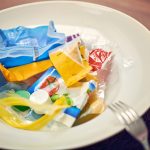Toxic feast: When plastic waste becomes your next meal
 (NaturalHealth365) Not long ago, humanity enjoyed an era when food was organically grown, free from chemicals, and completely untainted by modern contaminants. Plastics were nonexistent in those days, ensuring a pristine food supply.
(NaturalHealth365) Not long ago, humanity enjoyed an era when food was organically grown, free from chemicals, and completely untainted by modern contaminants. Plastics were nonexistent in those days, ensuring a pristine food supply.
Shocking reality: How the U.S. Department of Defense is contaminating our food supply
In a startling move that has largely escaped mainstream media attention, the U.S. Department of Defense (DOD) recently awarded a $7.2 million deal to Michigan Tech researchers to convert plastic into protein powder. This cooperative agreement, backed by the Defense Advanced Research Projects Agency (DARPA), aims to transform plastic military waste into food for human consumption.
DARPA, the same government agency that created the internet half a century ago, is now venturing into the realm of food production. Critical thinkers are right to question the wisdom of using public tax dollars to turn plastic military waste into something intended for our plates.
On the surface, the plastic-to-food conversion project might seem like a practical solution to plastic waste. However, this initiative is a horrible trap. While plastic is indeed ubiquitous, and microplastics have even been found in multiple human organs, the answer is not to convert plastic into food through highly complex chemical processes. This approach poses significant risks to our health and well-being, highlighting the urgent need for a more sensible and safe solution to our plastic problem.
The details of the federal government’s long-shot attempt to convert plastic into sustenance
If DARPA and Michigan Technological University succeed, they will perfect a breakthrough method of pyrolysis to dismantle plastic waste into tiny particles that become protein powder. Pyrolysis is a conversion method that uses high levels of heat and chemicals.
Dubbed BioProtein, the project might succeed in eliminating plastic from our environment, albeit to a certain extent. Plastic is especially problematic as it is one of the most difficult wastes to handle. The challenge lies in breaking apart plastic’s inherently cohesive polymers. The research team also hopes to convert plastic into lubricant and fuel for military use.
Fake food is not the best approach to preserving our fragile planet
Sadly, too many people remain unaware that our food supply is increasingly filled with genetically modified organisms (GMOs) and chemically altered products. Impossible Burgers and Beyond Meat, for example, contain a slew of chemicals, including harmful glyphosate.
In addition, not enough food shoppers realize that some produce is sprayed with genetically modified spores, yet there are no required warning labels for these items. The addition of plastic-turned-protein into the food supply might push us toward a tipping point, forcing us to acknowledge that much of our food is fake or semi-fake.
Say “No!” to genetically modified faux foods by voting with your purchasing dollars. Shop at farmers’ markets, choose organic items at your local supermarket and consider growing your own food at home.
Above all, do your research before heading to the grocery store. Take the time to investigate the growing methods of the companies behind your favorite foods. Read nutrition labels while shopping and opt for wholesome organic items over modified ones. By making informed choices, you can help preserve your health and the integrity of our food supply.
Sources for this article include:



